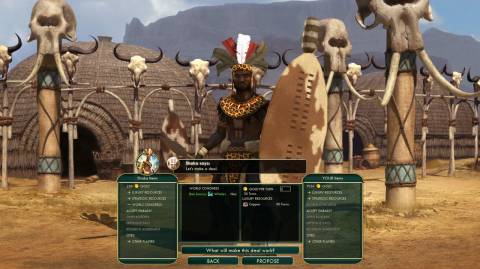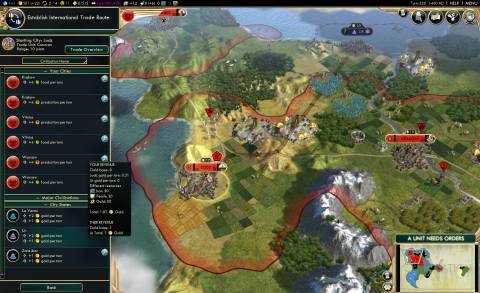Calling Civilization V's latest (and last) expansion Brave New World was an interesting, if not wholly accurate choice. We're now three years removed from Civ V's initial release, and a year from the last big expansion to overhaul this world-dominating strategy game. Brave New World is a bigger expansion than the last, and a more targeted one. It aims to revamp the sometimes tepid and mundane late-game elements with reworked culture mechanics, additional monetary resources, and a whole new method of diplomacy between civilizations. These are all changes that make perfect sense, and mostly manage to achieve Firaxis' goal of a better, less predictable late-game push, without making any major fundamental changes to the way Civ V is generally played. In this regard, Brave New World is perhaps less a brave step forward for this aging title, and more a sensible one. Then again, Sensible New World doesn't have quite the same ring to it, I suppose.

The most significant change to the core game is the addition of trade routes. Maybe it's just because I'm terrible at resource management, but I often found myself running into financial trouble in previous iterations of this game, especially once I started expanding further and further, building more roads, and so on. Trade routes make for an exceptional boon to players that tend to find themselves financially strapped, without just making it overtly easy to gain gold at all times. With these trade routes, you'll build either a land caravan or cargo ship to travel to other civs, city states, or even your own cities. You won't get gold if you travel to your own cities, but you can create food or production bonuses. Outside of your own empire, you'll receive nice gold bonuses (especially after you've built a caravansary in your originating city), apply religious pressure, and even gain some small science boosts from certain empires. The risk is that trade routes are easily plundered. Going to war all but assures your trade routes will get swallowed up, and early on, when barbarians are still a frequent risk, you'll have to make sure your routes are regularly clear.
These trade routes are extremely important for every civ in the game, but several of the nine new civs added for this expansion, which include Morocco, Portugal, and Venice, focus largely on wealth acquiring and trade bonuses. Unfortunately, few of the new Civs feel particularly creative or unique within the greater scope of the dozens of other civs already present in the game. The Zulus and Assyrians, for instance, are both traditionally warlike cultures to add to the already lengthy list of those, while the Polish do little of note except collect extra social policies at the beginning of each new era. Not all of them are this way, of course. Morocco probably makes the best use of the new trade elements, while Venice has the distinction of being the only playable city state. With Venice, you cannot create settlers nor annex cities, but you can use a Merchant of Venice unit to "buy out" city states and make them puppets. Unlike other puppet states in the game, you can purchase buildings and units for them, which gives you a bit more control than you'd otherwise have, while still preventing you from traditional expansion.

Still, while not all the new civs are especially great, nearly all the mechanical changes made are to the game's benefit. Cultural victory, for instance, is no longer tied to the nebulous "utopia project," but rather through cultural influence that can only be earned through copious amounts of earned culture and tourism. You earn both those by spawning great artists, writers, and musicians, who each can create great works that will display in the museums, opera houses, amphitheaters, and great wonders you build in your cities. Each great work provides a culture boost, as well as a tourism boost. Tourism is essentially just a new metric that determines how desirable your empire is to visit. Early on, you won't get much tourism at all, but as you get past the industrial era, you'll start building tourism in large chunks. You can actually win through tourism by dominating that category, at which point you'll see a menu start ticking off civs that have become influenced by your culture. You'll even get some world leaders coming to you complaining that their citizens are wearing your blue jeans and listening to your pop music all the time.
The only problem with the tourism victory is that you really don't get the bonuses needed to gain that kind of influence until the very end of the game. By that point, you'll probably have already achieved some major progress toward scientific or diplomatic victory. That diplomatic victory, by the way, comes via the new world congress, which eventually evolves into the United Nations. Long before you can win the game, all still-active civs will be able to start voting on worldwide measures and laws that can have huge impact on the late game. If you're feeling friendly, you can simply suggest civs put resources toward a world's fair, or international games, which will afford the winners policy and tourism bonuses. If you're looking for more targeted measures, you can propose measures that will increase great scientists, or great artists, depending on which victory you're working toward. And if you're feeling antagonistic, you can vote to ban certain luxury resources that are key to other civs' survival, or even vote to embargo all trade with them.

All that diplomacy and cultural influence also plays into the game's new ideologies, which are expansions from the previous cultural policies. Once a civ has either entered the modern era, or built three factories, you'll be able to choose an ideology from the options of freedom, autocracy, or order. Those obviously existed in the previous versions of the game, but here they've been split out into their own, much larger branches and tiers of policies. One of the key elements to ideologies is making sure your ideology is the dominant one in the world. If you choose, say, autocracy, but multiple other civs choose freedom, you'll have to ensure that your culture is the strongest of the world, otherwise your citizens will begin to revolt and unhappiness in the empire will spread quickly. You can change your ideology later if you like, though that comes with its own set of penalties. If you opt not to change and your citizenry become too unhappy, cities may actually revolt and join another civ. It's an exceptionally careful balance to maintain, but if you play smartly, you'll dominate your opponents.
All of these changes serve to make Civ V's late-game a much more enjoyable endeavor. The inevitability of victory is greatly lessened, and it's entirely possible to totally throw the established order of things into disarray if you happen to get some big tourism and/or culture boosts later on. For those reasons, Brave New World is easy to recommend to anyone who still has an active interest in the game. The new civs and added scenarios (which include the mostly throwaway Scramble for Africa and Civil War additions) might not bowl anyone over, but from a purely mechanical perspective, Brave New World's additions make this the ideal version of Civilization V.

55 Comments